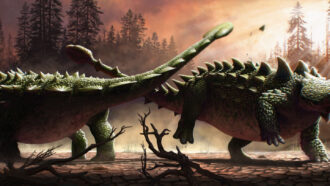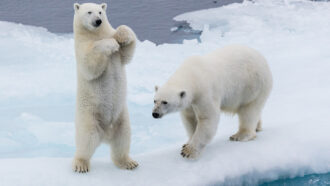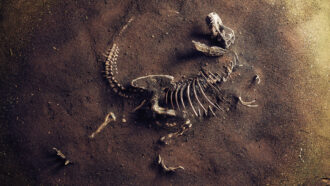All Stories
-
 Archaeology
ArchaeologyNeandertals were a lot like our human ancestors
From toolmaking to healthcare, new research finds that Neandertals shared many cultural and social similarities with our human ancestors.
-
 Fossils
FossilsArmored dinos may have used tail clubs to bash each other
Broken spikes on a fossil dino’s sides are consistent with the armored beast having received a mighty blow from another ankylosaur’s tail club.
By Jake Buehler -
 Science & Society
Science & SocietyLet’s learn about why schools should start later
The American Academy of Pediatrics recommends that middle and high schools start no earlier than 8:30 a.m.
-
 Physics
PhysicsScientists Say: Fission
Nuclear fission is the process of splitting atoms apart to release huge amounts of energy.
-
 Tech
TechUnderwater cameras get a new power source — sound!
Needing no batteries, a new digital camera can run almost continuously to offer new, deeper insights into the ocean world.
-
 Animals
AnimalsTiny bumps on polar bear paws help them get traction on snow
Super-small structures on the Arctic animals’ paws might offer extra friction that keeps them from slipping on snow, a new study concludes.
By Meghan Rosen -
 Physics
PhysicsExplainer: What is friction?
The force of friction always acts to slow things down. It depends on just two factors: the surfaces and how hard they press together.
By Trisha Muro -
 Environment
EnvironmentMicroplastic pollution aids viruses and prolongs their infectivity
The tiny plastic bits give these germs safe havens. That protection seems to increase as the plastic ages and breaks into ever smaller pieces.
-
 Chemistry
ChemistryWas that fingerprint left during a crime? A new test may answer that
In what could be a boon to forensics, Iowa State University chemists have come up with a way to analyze the age of fingerprints.
-
 Physics
PhysicsExplainer: Radiation and radioactive decay
Like clockwork, radioactive forms of some elements shed parts of themselves as they attempt to become nonradioactive.
By Janet Raloff and Trisha Muro -
 Physics
PhysicsExplainer: Radioactive dating helps solve mysteries
Knowing the decay rate of radioactive elements can help date ancient fossils and other artifacts.
By Trisha Muro -
 Earth
EarthFossil-fuel use is confusing some carbon-dating measurements
Carbon-14 dating of recent artifacts will soon give scientists confusing results. That’s another price society pays for its reliance on fossil fuels.
By Trisha Muro